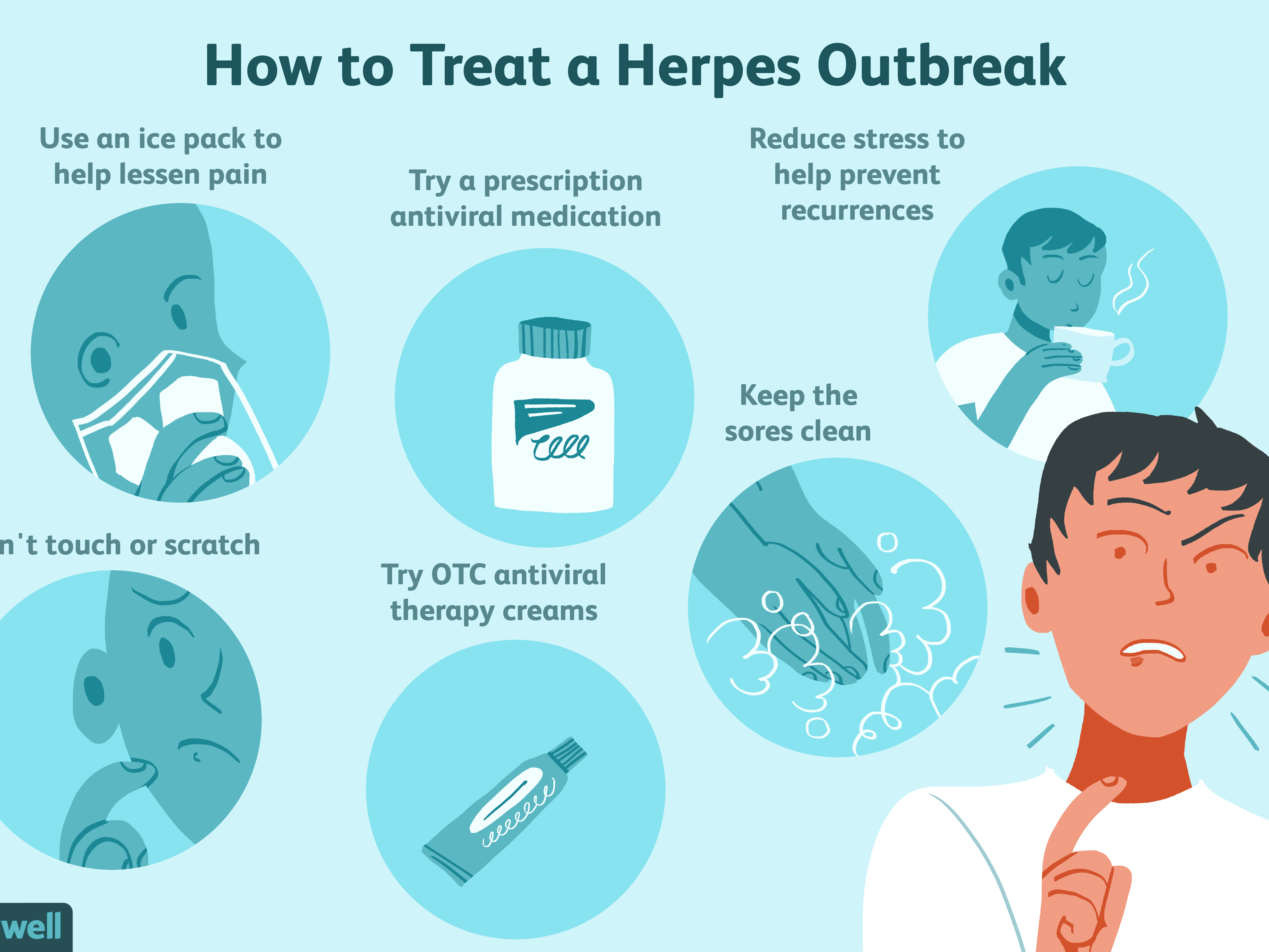During A Genital Herpes Outbreak
Most genital herpes infections that develop on the skin and or genitals can be managed at home with over-the-counter pain medications and other symptomatic relief. Others however, will require you to contact your health care provider for prescription anti-viral relief.
Symptomatic Relief
A number of simple steps can produce some relief:
- Avoid touching the sores. Wash your hands frequently during the day and make sure to clean underneath your fingernails.
- Drink plenty of water to stay hydrated.
- Blisters or sores should be kept clean and dry with an agent such as cornstarch. (Talcum power and baby powder should never be used because of their association with an increased risk for ovarian cancer.)
- Some people report that drying the genital area with a blow dryer on the cool setting offers relief. Instead of using a towel, this way avoiding any rubbing of the area.
- Avoid tight-fitting clothing, which restricts air circulation and slows healing of the sores. This includes tight jeans.
- Wear cotton underwear during an outbreak instead of nylon or other synthetic materials.
- Local application of ice packs may alleviate the pain and swelling.
- Since urination can be painful with active sores, urinating in a cool shower a less painful way to pee. This dilutes the urine and prevents burning the sores. Of course this is not very practical all day long, but I thought it was worth mentioning.
- Sex should be avoided both during the outbreaks and the prodromes (the early symptoms of herpes), which include tingling, itching, or tenderness in the infected areas. Yes, some people don’t get these warning signs at all. Women tend to get them more.
- Over-the-counter medications such as aspirin, acetaminophen (Tylenol), or ibuprofen (Advil, Motrin, Nuprin), can be used to reduce fever and local tenderness. Children should take acetaminophen; they should never be given aspirin, btw.
Stress Management
In one study, stress management techniques developed using cognitive-behavioral methods were not only effective in reducing depression in those with HSV-2 but blood test results also revealed lower levels of HSV-2 antibodies. In any case, reducing stress using relaxation techniques does no harm.
Special Diets or Foods
L-lysine: No special diet has been proven to reduce symptoms of herpes virus. Some people take supplements of L-lysine to prevent cold sores; 1,000 mg per day seems to help sores heal rapidly. (I have tried L-lysine for herpes simplex 1 with no success, but it may still be worth trying).
There are unproven claims that eating certain foods that are both high in L-lysine and low in arginine (both are amino acids) will help prevent outbreaks of oral HSV-1. Such foods include most dairy products (especially yogurt), beets, apples, pears, mangos, oily fish (such as salmon, haddock, snapper, and swordfish), soybean sprouts, chicken, and tomatoes.
No one, however, should avoid the many healthy foods that have the reverse ratio ( low L-lysine and high arginine) because of any unsubstantiated claims. Such foods include nuts, many fruits, garlic, onions, whole grains, and green vegetables. (Some people have even found that garlic capsules are helpful.)
Caffeine: Caffeine has some anti-herpesvirus properties, although it is not known whether drinking caffeinated beverages would have any effect on HSV-1.
Herbal and Other Alternative Remedies
There are many unproven claims for numerous alternatives and unconventional remedies for herpes simplex. Among those that have shown no additional advantages are vitamins, minerals, and light therapy.
There are anecdotal reports of relief from other herbal or over-the-counter remedies, including the following:
- Cream made from Melissa, an herb from the mint family.
- Aloe vera ointments for genital herpes.
- A dropper-full of an extract of echinacea applied to the sores every few hours. A 2001 study reported no benefits from echinacea purpura (Echinoforce) compared to a placebo, however, but the study had limitations. A product called viracea (ViraMedx) contains echinacea and other natural compounds. It appeared to have some activity against herpes virus simplex in a 1998 study. More research is needed.
- Tea tree oil for mouth sores.
- An ointment for genital herpes made from propolis, a substance made by bees from tree resin.
- An extract from the plant Prunella vulgaris is showing promise for stopping HSV-1 and HSV-2 viral growth in cells, even in acyclovir resistant strains. More research is warranted on this interesting substance.
It should be noted, however, that many herbal treatments are not harmless, they are not regulated, and they can be very potent. Few have been tested for benefits or side effects.
No alternative treatment should be tried without discussing it first with your health care provider. This is even more important if you take prescription medication (other than and including “the pill”).
If you take medications for HIV always discuss any herbal treatments with your health care provider!
Good luck. Now, go put on a pair of loose cotton sweat pants or bottoms.
![]() Return to Genital Herpes
Return to Genital Herpes
![]() Use a CONDOM every time you have sexual intercourse. For condom help…
Use a CONDOM every time you have sexual intercourse. For condom help…
- To Sex Stuff and STDs
- Visit Condomania Online for condoms in 70 different sizes!
